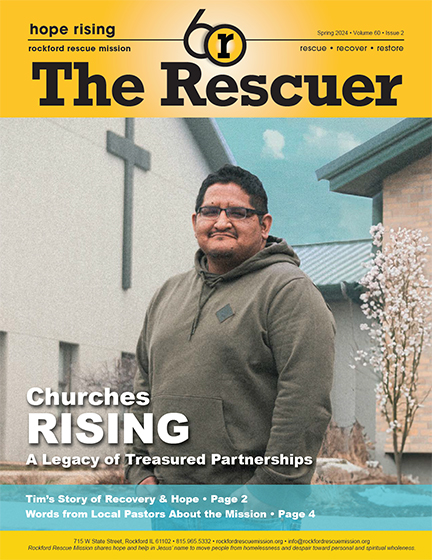The cover story for our Spring issue of The Rescuer warms my heart. Tim has walked a hard road and today finds himself in a good place with God and with the people in his life. The Mission has been a big part of that, of course, and so has the church he’s become a part of, Maywood Free Church.
From the very beginning, churches have been a significant part of Rockford Rescue Mission’s ministry to homeless and hurting people in our community. It was a pastor from the Harrison Congregational Church, Dean Lange, who first suggested to Ray Stewart that he come to Rockford and start a mission. Members of the Kilburn Avenue Church of the United Brethren in Christ helped clear junk out of our original building before it opened. And on the Mission ‘s very first night—May 1, 1964—Dean Hoobler from that church preached our first chapel service.
One of Ray’s first phone calls that spring was to First Baptist Church of North Park (now Machesney Park). “I’m not a preacher,” he told my father-in-law, Rev. G.O. Pitney. “I just know that God wants this type of work here to help men like I’ve been. Would you come help?” G.O. and Nadine did, and they brought more help from their church, too. By the next year, G.O. was the Mission’s director and five small Baptist churches in the Rockford area had put support for the Mission into their budgets.
Hundreds more churches would follow over the next six decades. Many of those churches have welcomed some of our guests and residents for Sunday services, too. One longtime partnering church, First Free Rockford, even hosts our Sunday morning worship service at the Mission.
All to say: Rockford Rescue Mission would not have come into existence 60 years ago, and certainly would not exist today, without our partnerships with churches. We are not a church, nor are we the arm of any one church or denomination. We represent the collective, local Body of Christ. That is a beautiful picture of how a whole community can follow Jesus’ words in Matthew 25: “Truly I tell you, whatever you did for one of the least of these brothers and sisters of mine, you did for me.”
G.O. used to call it “the church in overalls.”
Partners in Hope,

Sherry Pitney, CEO







